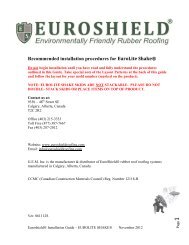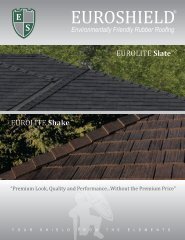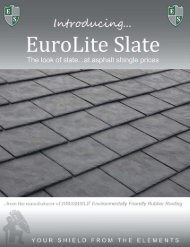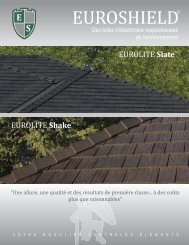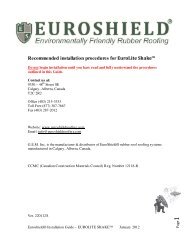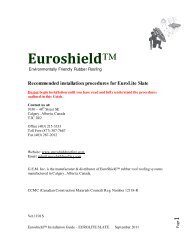Recommended installation procedures for EuroLite ... - Euroshield
Recommended installation procedures for EuroLite ... - Euroshield
Recommended installation procedures for EuroLite ... - Euroshield
Create successful ePaper yourself
Turn your PDF publications into a flip-book with our unique Google optimized e-Paper software.
In the wake of technical advances and the proliferation of energy conservation measures, the<br />
‘trapping’ of air and moisture in the attic is problematic. Improved insulation and better weather<br />
stripping are the two major reasons <strong>for</strong> this occurrence.<br />
To correct this problem one needs to provide proper ventilation to ensure free and unobstructed air<br />
movement beneath the roof surface.<br />
The National Building Code (Canada) requires that all roof and attic spaces above an insulated<br />
ceiling shall be ventilated with openings to the exterior to provide unobstructed vent areas of not<br />
less than 1 sq.ft./300 sq.ft with a suggested minimum of 1sq.ft/200 sq.ft. The vents shall be<br />
uni<strong>for</strong>mly distributed on opposite sides of the building, in such a way that approximately 50% are<br />
near the lower part of the roof (inflow) and approximately 50% are near the ridge (outflow).<br />
Cathedral ceilings covered with the EuroShield® System require adequate ventilation like any<br />
other roof to prevent damage to the products or structure. There should be a minimum space of 2<br />
inches between the roof sheathing and the insulation to allow <strong>for</strong> unobstructed air movement.<br />
When vapour barrier is used, cathedral ceilings require a minimum total net area <strong>for</strong> the inlet and<br />
outlet vents equivalent to 1/300 of the total ceiling area with a suggested minimum of 1/200. Cross<br />
ventilation should be ensured by locating half the required vent area at the eaves and the other half<br />
at the ridge.<br />
Vent manufacturers should be consulted on the proper use of their products.<br />
FASTENING<br />
THE SHAKE IS ATTACHED USING SEVEN (7) 1 ¾”galvanized nails in the locations<br />
shown in the image below. Nails should be placed ¾” above the open keyways as indicated by the<br />
arrows. This will ensure that there are 14 attachment points in each <strong>EuroLite</strong> Shake panel, as<br />
the seven (7) nails will go through the top of the panel in the course below.<br />
Care should be taken to make sure nails are driven flush with the surface of the <strong>EuroLite</strong> Shake<br />
panel. Nails driven below the panel surface such that a depression or cavity is created in the rubber<br />
panel can reduce the surface contact area <strong>for</strong> proper bonding of the adhesive strip. If using a<br />
compressor-operated nailer, adjust pressure to the point where the nail is driven flush with the<br />
panel surface.<br />
<strong>Euroshield</strong>® Installation Guide – EUROLITE SHAKE March 2012<br />
Page10



